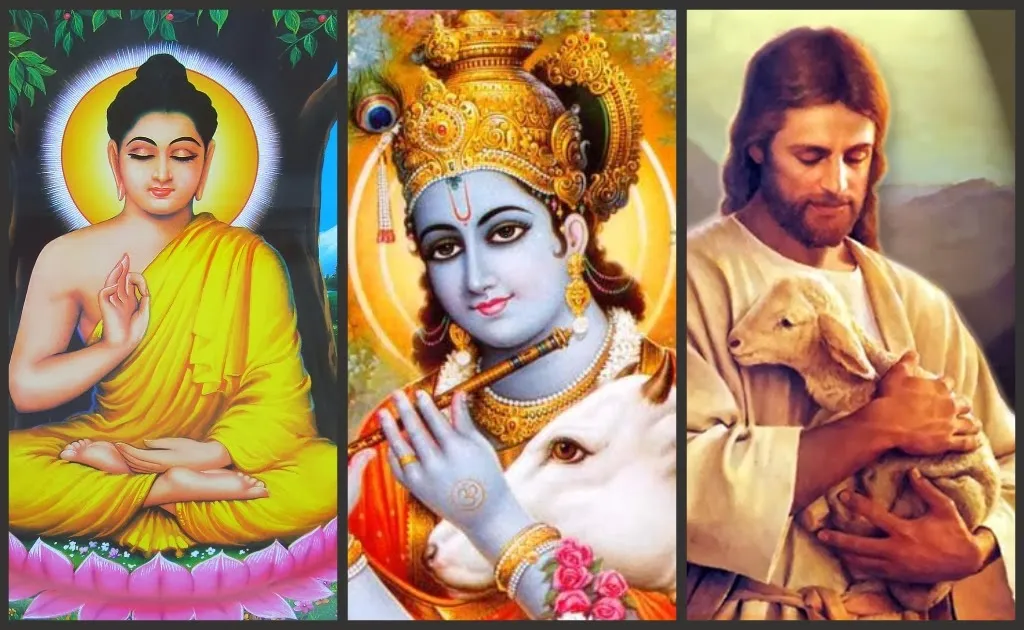
El cielo, también llamado «Paraíso», todos hemos escuchado acerca de ese lugar idílico y maravilloso en el cuál los cristianos, judíos y musulmanes creemos que hallaremos reposo eterno, pero probablemente no sabían que el concepto de «Cielo» existe también en otras religiones, incluso en las politeístas, así que si sienten curiosidad, quédense para saber cómo es el cielo según las diversas religiones.
Heaven, also called "Paradise", we have all heard about that idyllic and wonderful place in which Christians, Jews and Muslims believe we will find eternal rest, but probably didn't know that the concept of "Heaven" also exists in other religions, even in polytheistic ones, so if you are curious, stay to know what heaven is like according to the various religions.

El cielo es un concepto que está presente en muchas religiones que lo perciben como un lugar de reposo, habitado por ángeles, dioses o héroes, lleno de alegría infinita sin espacio al sufrimiento, no obstante, los aspectos que lo componen varían según la religión o cultura.
Heaven is a concept that is present in many religions that perceive it as a place of rest, inhabited by angels, gods or heroes, full of infinite joy with no room for suffering, however, the aspects that compose it vary according to the religion or culture.
«Aaru» Según la cultura egipcia
«Aaru» according egyptian culture
Si han leído mis post referentes al mundo egipcio, sabrán que ellos pensaban que cuando una persona moría (sin importar su comportamiento en la tierra) iba la Duat (el reino de los muertos) y después de pasar una serie de pruebas, finalmente se enfrentaba al llamado «Juicio de Osiris» donde su corazón era comparado con el peso de una pluma. Si el corazón pesaba menos que la pluma, significaba que había sido una buena persona y entonces merecería entrar en el Aaru.
If you have read my posts concerning the Egyptian world, you will know that they thought that when a person died (regardless of his/her behavior on earth) he/she went to the Duat (the kingdom of the dead) and after passing a series of tests, he/she finally faced the so-called "Judgment of Osiris" where his/her heart was compared to the weight of a feather. If the heart weighed less than the feather, it meant that he/she had been a good person and then he/she would deserve to enter the Aaru.
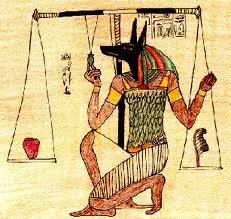
En los papíros egipcios el Aaru es descrito como un lugar tremendamente fértil, en otros es descrito como una serie de islas cubiertas de caña. Ellos creían que era un lugar rodeado de aguas diáfanas, con muchos animales para cazar y en el cual vivía Osiris
In the Egyptian papyri the Aaru is described as a tremendously fertile place, in others it's described as a series of reed-covered islands. They believed that it was a place surrounded by clear waters, with many animals to hunt and in which Osiris lived.
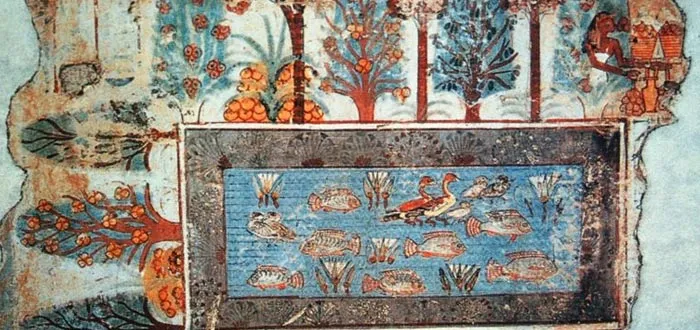
Yanna islámico
Islamic Yanna
Según el islamismo y al igual que en todas las religiones, al paraíso solo entran los justos, sin embargo como hay unos más justos que otros, todos serán tratados de acuerdo a su comportamiento en la tierra.
According to Islam, as in all religions, only the righteous enter paradise, but since some are more righteous than others, all will be treated according to their behavior on earth.
El paraíso musulmán tiene 8 puertas principales con 100 niveles. Hay puertas para los que oran mucho, para los que ayunan (ésta se llama Ar Raîân) también hay puertas para las personas caritativas y para los que participan del Yihâd (esfuerzo que hace un muslmán para que la ley divina reine en la tierra). En el nivel más alto estarían los piadosos que hayan vivido con humildad y podrán gozar de una vida plena, y feliz.
The Muslim paradise has 8 main gates with 100 levels. There are gates for those who pray a lot, for those who fast (this is called Ar Raîân), there are also gates for charitable people and for those who participate in Jihâd (effort that a Muslim makes so that the divine law reigns on earth). At the highest level would be the pious who have lived with humility and will be able to enjoy a full, happy life.
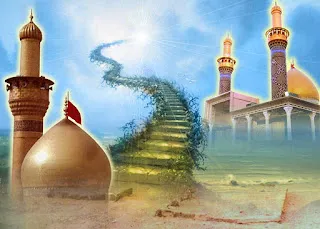
En el paraíso islámico todos tendrán 33 años de edad y tendrán la misma estatura, estarán rodeados de todos sus familiares (siempre y cuando también hayan vivido con justicia) Podrán gozar de todos los placeres que quieran sin límites y tendrán a su disposición perfumes, casas lujosas, oro, además de ríos de leche y miel. Los hombres que hayan sido buenos en la tierra podrán convivir con hermosas mujeres, pero la mayor recompensa de todas sería contemplar el rostro de Allah.
In the Islamic paradise everyone will be 33 years old and of the same height, they will be surrounded by all their relatives (as long as they have also lived justly), they will be able to enjoy all the pleasures they want without limits and they will have at their disposal perfumes, luxurious houses, gold, as well as rivers of milk and honey. Men who have been good on earth will be able to live with beautiful women, but the greatest reward of all would be to behold the face of Allah.
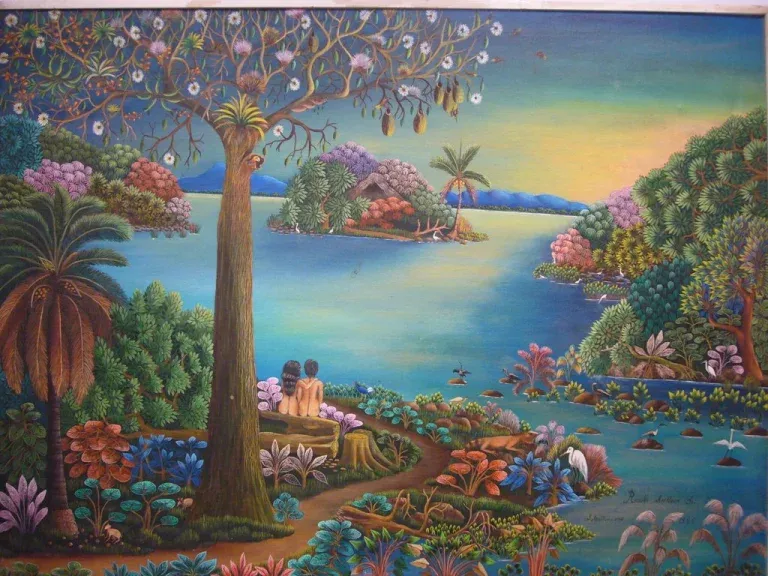
Swarga para los hindúes
Swarga for Hindus
La religión hindú sostiene la creencia de la reencarnación, por lo tanto el Swarga o Suargá sería como una especie de lugar temporal ubicado por encima del monte Meru, en el cual las personas esperan el turno de su próxima reencarnación. Solo dejarán de reencarnar las personas que estén listas para el Moksha, es decir, la liberación espiritual o unión con el Brahman (el Dios supremo).
The Hindu religion holds the belief of reincarnation, therefore the Swarga would be a kind of temporary place located above Mount Meru, where people wait for their next reincarnation. Only people who are ready for Moksha, that is, spiritual liberation or union with Brahman (the supreme God), will stop reincarnating.
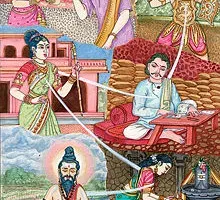
Nirvana budista
Buddhist Nirvana
Para los budistas, el Nirvana es un estado de liberación de todo sufrimiento y del ciclo de reencarnaciones, es imposible describirlo con simples palabras por lo que es, por lo tanto los budistas suelen describirlo por lo que NO es.
For Buddhists, Nirvana is a state of liberation from all suffering and the cycle of reincarnations, it's impossible to describe it in simple words for what it is, therefore Buddhists usually describe it for what it is NOT.
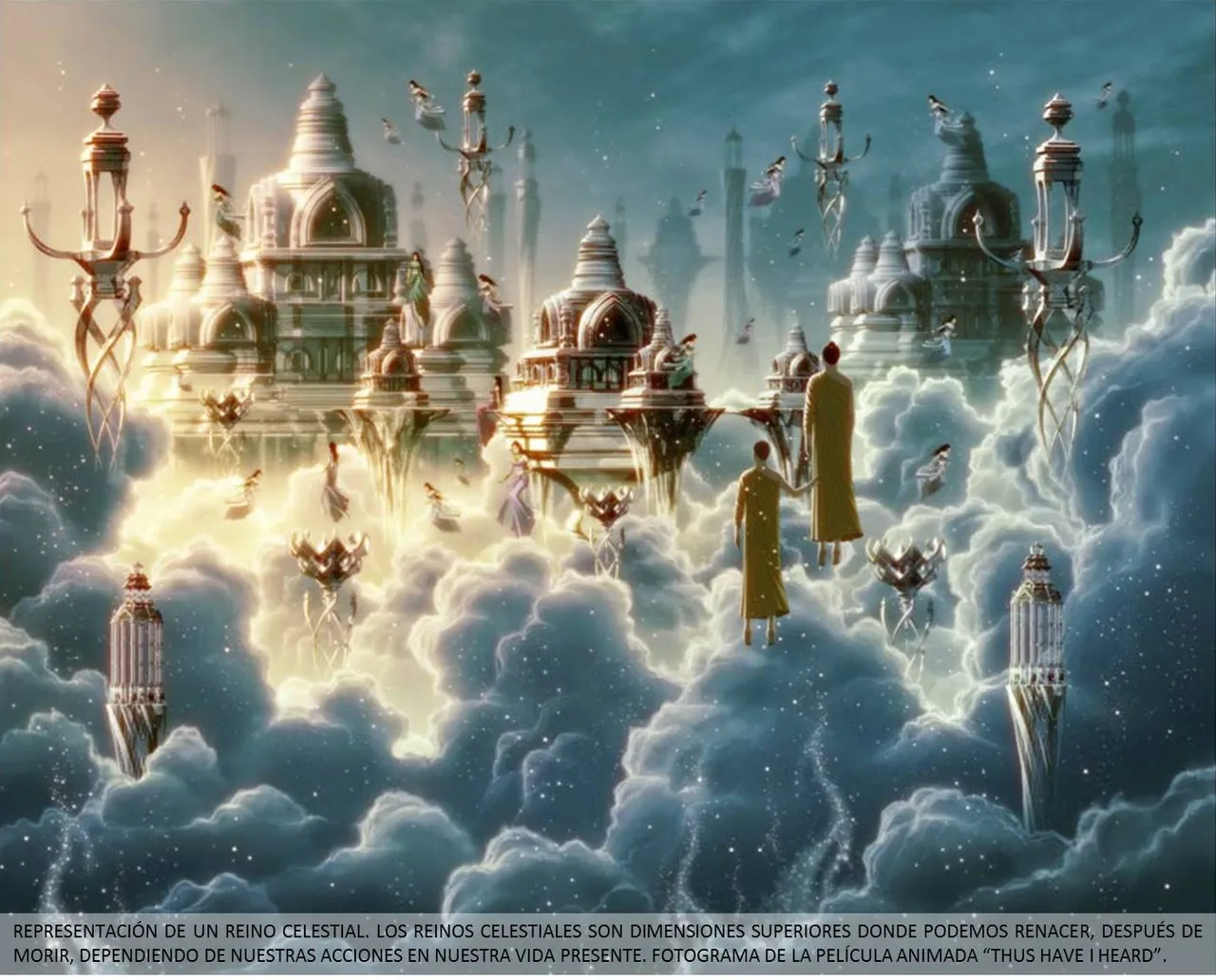
- No es la existencia común a la que está sujeto el ser humano.
It's not the common existence to which the human being is subject.
- No tiene principio ni fin (no se encuentra dentro del tiempo medible).
It has no beginning and no end (it is not within measurable time).
- No se puede generar o fabricar.
It cannot be generated or manufactured.
- No tiene dualidad, por lo que no puede ser descrito con palabras.
It has no duality, so it cannot be described in words.
- No es un estado subjetivo de conciencia.
It's not a subjective state of consciousness.
- No está condicionado a nada o por nada.
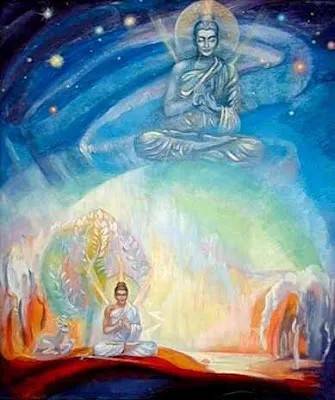
It's not conditioned to anything or by anything.
- No es ningún tipo de desarrollo o conversión.
It's not any kind of development or conversion.
- No tiene partes o etapas que se puedan distinguir unas de otras
No parts or stages that can be distinguished from each other

Siempre me ha gustado investigar acerca de diversos temas y como son percibidos según las diferentes culturas y religiones del mundo, creo que independientemente de cual sea nuestra creencia, la clave para vivir en armonía con nosotros mismos y con los demás está en la tolerancia y el respeto a esas culturas, religiones y formas de pensar distintas, de cualquier manera el concepto de cielo se percibe en el mundo entero como una recompensa por las buenas acciones del ser humano, como un incentivo para promulgar la bondad, de modo que sea cual sea nuestra creencia o forma de pensar, debemos sentir un profundo respeto por los demás.
I have always liked to research about different topics and how they are perceived according to different cultures and religions around the world, I believe that regardless of what our belief is, the key to live in harmony with ourselves and with others is in tolerance and respect for those cultures, religions and different ways of thinking, anyway the concept of heaven is perceived worldwide as a reward for the good deeds of the human being, as an incentive to enact goodness, so whatever our belief or way of thinking, we must feel a deep respect for others.
Así que sin más que agregar por el día de hoy, me despido agradeciendo su atención y su apoyo, mis queridos amigos
So, with nothing more to add for today, I take my leave thanking you for your attention and support, my dear friends.

Image designed by me in canva
A continuación les dejaré la fuente de la cuál extraje parte de información que usé para la realización de este post.